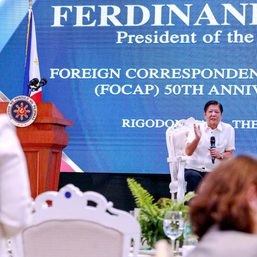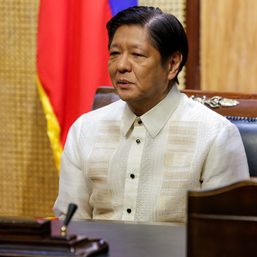SUMMARY
This is AI generated summarization, which may have errors. For context, always refer to the full article.
![[Newsstand] On (what I once called) ‘hysterical activism’](https://www.rappler.com/tachyon/2022/07/TL-hysterical-activism-July-20-2022.jpg)
It was startling, but characteristic. Two days after a newspaper profiled a volunteer who was archiving Marcos-era material, the activist writer Katrina Stuart Santiago took to Twitter to make three sweeping accusations: First, that “others started taking and creating their own repositories” of Martial Law material “from” the “primary repository” she said she “started in September 2021.” Second, that news organizations should have known about her role, “but they don’t” and weren’t “interested in it at that time.” And third: “of course in the Philippines only those who hustle for media mileage get it.”
The first and third accusations are outright falsehoods. The second may be true; I was one of those journalists who did not know about this particular project. But it may also be false; I do not know if other journalists knew about it and (a) did report on it or (b) wanted to report on it but did not get the editors’ okay or (c) did not care at all. In the context of her other accusations, however, the second is, at the minimum, misleading; it paints a picture of media complicity.
She did not name the young people behind what is now called Project Gunita, but these enterprising activists, among the many who have responded first to the possibility and then the inevitability of a second Marcos presidency by archiving Martial Law material, not only felt alluded to; they, and especially the student who was profiled in the Inquirer, Karl Patrick Suyat, suffered the backlash generated by Santiago’s tweets.
But Santiago’s project could not have been the primary repository she claims it to be: I personally know of volunteers who, in recent months, physically scanned the Martial Law-era publications collected by the Bantayog ng mga Bayani. The Guardian has reported on the ongoing and now even more urgent digitization by the Human Rights Violations Victims’ Memorial Commission of its victim case files. And volunteers Suyat, @lakwatsarah, and others trace the start of what became Project Gunita to at least October last year – all done without, to quote Santiago’s blithe and self-righteous language, “leeching off someone else’s” work. As many have now pointed out, others have blazed the digitization trail before her, including Mon Ramirez of Arkibong Bayan and @randomsalt.
And it isn’t true that “only those who hustle” get covered by the media; there are innumerable examples to choose from, but the most relevant, and the most pointed, is that of Project Gunita itself. The story on Suyat was not solicited, but rather the enterprising work of reporter Krixia Subingsubing. Besides, thinking only the hustlers get covered is a perspective that not only condemns the subjects of such coverage, but debases the media, for which Santiago writes.
In short, Santiago’s accusations reveal exactly the kind of activist patrolling that has been a self-defeating feature of opposition politics, and that ironically forms an obstacle to opposition unity.
Willful gatekeeping
Last August, in yet another column analyzing opposition politics, I tried to coin a phrase: “I have always been concerned that what we can call ‘hysterical activism’ (loud calls to unite that come with acts of willful gatekeeping, immediately excluding others) will get in the way of organizing a broader political coalition.”
I have reservations about the phrase now; I actually had Santiago specifically in mind when I thought of the term because of her strident and self-justifying positions on the dynamics of the political opposition, but now I see that the phrase is flawed because it is fundamentally gendered. “Hysterical” (derived from the Greek word for “womb”) is all too often used to demean women. I certainly did not mean that; I was and am aware of male activists who also fit the bill – but it is possible that I may have been subconsciously led to the use of that term.
At that time, however, I used “hysterical” to describe the kind of showy, self-indulgent, attention-seeking patrolling of activism’s many porous borders. As I originally defined it, the shouted, impatient premise of that kind of activism was opposition unity, but it was always accompanied by, or always led to, a puzzling attempt to control the terms of that union. It was, always, about guarding the gate, about policing the lane.
The phrase is flawed, but I think both the reality and the definition stand. We should change the term to something equally descriptive but non-gendered: maybe police activism or constabulary activism if we want to put the focus on the patrolling of activism’s many gates, maybe access activism, if we want to spotlight the emphasis on control.
Characteristic conduct
I’ve met Santiago only once, on the sidelines of a PEN forum I think, but we have exchanged messages before, and I’ve read her or at least followed her on Twitter, fairly consistently, for a long time. But in recent years, her constant focus on the (admittedly many) shortcomings of the Liberal Party has drastically narrowed her perspective. As I found out belatedly, it is a focus that does not come so much from a progressive position, as her Twitter handle @radicalchick would make one think, but from her experience as “part” of Jojo Binay’s presidential campaign in 2016.
Nothing wrong with that, but it helps explain why her analysis of Leni Robredo and her campaign was so constricted, a consistent failure to imagine what was newly possible. She was busy manning the gate that kept those damn LPs away, and did not see or understand why so many new gates were opening up, welcoming more supporters for Robredo. She failed to see Robredo and Kiko Pangilinan as the true focus of a genuine movement.
But she has been serving as self-appointed gatekeeper for a long time. Here are a few examples that I am personally aware of: calling out a disinformation conference for not inviting the scholar Jonathan Corpus Ong, confidently ignorant that the very first edition of that conference already featured Ong and his co-author Jason Cabanes; maligning Maria Ressa as “never for nation,” confident in the astonishing scope of her baseless malice; undermining the community pantry phenomenon by insisting that “Lahat yan propaganda. Lahat ulterior motive. Hindi yon masama. Labanan siya ng propaganda” – substituting her confident cynicism for the idealism of many volunteers. (All that is propaganda. All ulterior motive. That’s not bad. Fight it with propaganda.)
Preserving the Martial Law and Marcos-era record in digital files that are accessible anywhere and anytime should be uncontroversial; it is exactly what is needed, has been done before Santiago even raised the idea, and should be encouraged as a potentially viral act of protest and solidarity. Why she thought it was another gate to guard, another lane to police, is startling, but characteristic.
This could have been resolved if she only took back what she said. That she has kept an undignified silence since the controversy she started herself, with her accusations of stealing and insinuations of Marcosian behavior left to hang in the air, is itself Marcosian. It’s like avoiding a debate one cannot win. – Rappler.com
Veteran journalist John Nery is a Rappler columnist, editorial consultant, and program host. “In the Public Square” airs every Wednesday at 8 pm.
Add a comment
How does this make you feel?

![[Newspoint] The lucky one](https://www.rappler.com/tachyon/2024/04/lucky-one-april-18-2024.jpg?resize=257%2C257&crop=536px%2C0px%2C1080px%2C1080px)
![[Just Saying] Marcos: A flat response, a missed opportunity](https://www.rappler.com/tachyon/2024/04/tl-marcos-flat-response-april-16-2024.jpg?resize=257%2C257&crop=277px%2C0px%2C720px%2C720px)


There are no comments yet. Add your comment to start the conversation.